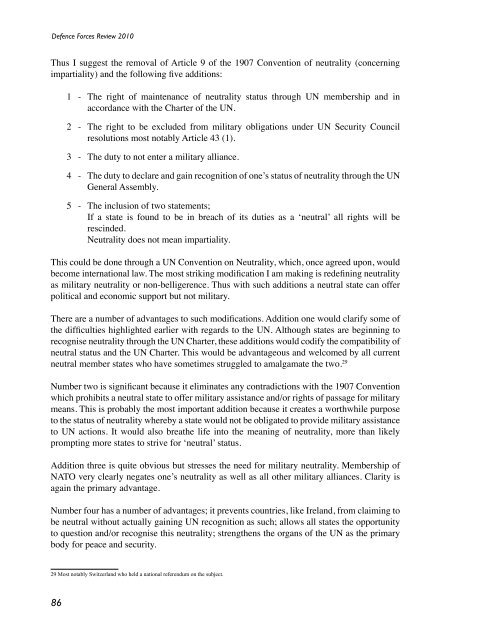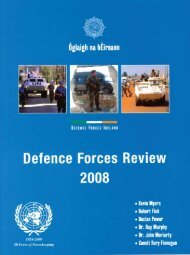Does Neutrality Law Matter?and international law. International law is the only legitimate alliancepartner of a neutral country. The idea of neutrality is to not supporthegemony and to champion the peaceful, equitable coexistence of all thecountries of this world. That is Switzerland’s understanding of neutralityand how it intends to exercise it here in the UN. 24Thus we can see that neutrality is no longer strict impartiality but an adherence to internationallaw and more specifically the UN Charter. 25 Does this mean that when the UN SecurityCouncil makes a condemnation, such as terrorism or the Iraq invasion of Kuwait, all membersby fulfilling their obligations, can still somehow remain neutral? Or that, in the face of threatsto peace and security, as decided by the UNSC, no country is neutral? In reality, it is the latterbut in legal terms the former is true.The UN to a certain degree has attempted to transform all states to a status of non-belligerent,eliminating the need to be neutral, and should a conflict arise the Security Council will decidewhose side you are on. Therefore the idea of neutrality is still that which is set out in the1907 Convention unless the UN Security Council decides otherwise, in which case the stateremains neutral as long as it supports the Council against the belligerent or threat. Thus theprinciples of neutrality are becoming the principles of non-belligerence as set out in the UNCharter. 26ModificationsIf the concept of neutrality is to have any relevance for contemporary Ireland, it needs tobe re-examined and defined for a modern society. With the removal of war as a legitimatemethod of diplomacy, neutrality is heading towards redundancy. Finland and Sweden havealready dropped the word ‘neutrality’ in official texts, Austria appears to be drifting towardspossible NATO membership, 27 the Swiss have joined the UN, and Irish courts have foundthat Irish foreign policy is not compatible with any status of neutrality in international law. 28The ambiguous policies practised by so-called ‘neutrals’ need to be properly institutionalised,otherwise there is little point of neutrality existing when nobody is adhering to its ideals. Aswe have seen above, the use of force is now prohibited unless in certain circumstances andthose that instigate it are seen as Cicero’s pirates once were, hostis humani generis. Withthe growth of the UN, a more ‘moral’ approach is emerging in International Law, whichis attempting to veer from the realist ideologies of the past. However, some states, such asIreland, still value the concept of neutrality and the principles it upholds, using it to theiradvantage on the international stage, either by projecting an independent stance or increasingthe credibility of their peacekeepers. Therefore it is necessary to modify the traditional laws ofneutrality and have them recognised in an international treaty or organisation so that neutralitydoes not become a meaningless concept.24 61st session of the UN GA, statement by Moritz Leuenberger: http://www.un.org/webcast/ga/61/pdfs/swiss_confederation-e.pdf25 See also Kofi Annan’s speech to the Council of Foreign Relations in New York (1999) Impartiality does not - and must not - mean neutrality, accessedat http://www.un.org/News/ossg/sg/stories/articleFull.asp?TID=38&Type=Article.26 See Roberts, A. and Guelff, R. (2000) Documents on the Law of War, Oxford University Press, (3rd Ed), p. 86. “In this reasoning “neutrals” are thosestates which apply the law of neutrality in its entirety, including its requirements regarding impartiality; while “non belligerents” or “other states notparties to the conflict” are those which, departing from certain aspects of the traditional law of neutrality, assist one of the parties to the conflict ordiscriminate against another.”27 Doherty, R. (2002) Ireland, Neutrality and European Security Integration, Ashgate Publishing, p. 21.28 Court decision of Horgan vs State, High Court, Kearns J., 28th April, 2003.85
<strong>Defence</strong> <strong>Forces</strong> <strong>Review</strong> <strong>2010</strong>Thus I suggest the removal of Article 9 of the 1907 Convention of neutrality (concerningimpartiality) and the following five additions:1 - The right of maintenance of neutrality status through UN membership and inaccordance with the Charter of the UN.2 - The right to be excluded from military obligations under UN Security Councilresolutions most notably Article 43 (1).3 - The duty to not enter a military alliance.4 - The duty to declare and gain recognition of one’s status of neutrality through the UNGeneral Assembly.5 - The inclusion of two statements;If a state is found to be in breach of its duties as a ‘neutral’ all rights will berescinded.Neutrality does not mean impartiality.This could be done through a UN Convention on Neutrality, which, once agreed upon, wouldbecome international law. The most striking modification I am making is redefining neutralityas military neutrality or non-belligerence. Thus with such additions a neutral state can offerpolitical and economic support but not military.There are a number of advantages to such modifications. Addition one would clarify some ofthe difficulties highlighted earlier with regards to the UN. Although states are beginning torecognise neutrality through the UN Charter, these additions would codify the compatibility ofneutral status and the UN Charter. This would be advantageous and welcomed by all currentneutral member states who have sometimes struggled to amalgamate the two. 29Number two is significant because it eliminates any contradictions with the 1907 Conventionwhich prohibits a neutral state to offer military assistance and/or rights of passage for militarymeans. This is probably the most important addition because it creates a worthwhile purposeto the status of neutrality whereby a state would not be obligated to provide military assistanceto UN actions. It would also breathe life into the meaning of neutrality, more than likelyprompting more states to strive for ‘neutral’ status.Addition three is quite obvious but stresses the need for military neutrality. Membership ofNATO very clearly negates one’s neutrality as well as all other military alliances. Clarity isagain the primary advantage.Number four has a number of advantages; it prevents countries, like Ireland, from claiming tobe neutral without actually gaining UN recognition as such; allows all states the opportunityto question and/or recognise this neutrality; strengthens the organs of the UN as the primarybody for peace and security.29 Most notably Switzerland who held a national referendum on the subject.86
















